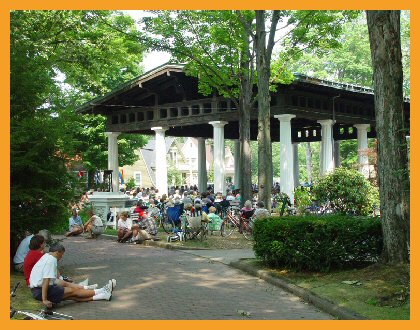 |
|||
 |
|||
 |
|||
 |
|||
 |
|||
 |
|||

by Monica Conrady
![]() ention Chautauqua
and, chances are, you’ll be met with a blank look or a puzzled expression.
This is surprising, since this many-faceted institution has been around for
more than a century. What began as a modest summer school for Sunday School
teachers, today is a world-renowned center for the arts, education, religion
and recreation.
ention Chautauqua
and, chances are, you’ll be met with a blank look or a puzzled expression.
This is surprising, since this many-faceted institution has been around for
more than a century. What began as a modest summer school for Sunday School
teachers, today is a world-renowned center for the arts, education, religion
and recreation.
Situated on the shores of Lake Chautauqua, in southwestern New York State,
not far from Lake Erie, this gem of a gated, Victorian village is now a Registered
Historic Landmark. Shady lanes lined with Victorian cottages, inns and meeting
halls have replaced the orderly rows of tents that once dotted the original
site.
The
Chautauqua experience begins the minute you pass through the red-brick entrance
gate.
When the Chautauqua Institution opened its doors in 1874, it was an instant
success. Popular education expanded rapidly and became known as the Chautauqua
Movement. Correspondence courses and “great books” curricula were
pioneered there. “Little Chautauquas” sprang up around the country,
and traveling tent Chautauquas (not connected with the Institution) brought
education and culture to the rural areas. Most of these offshoots faded away
decades ago, but the original, now in its 133rd year, is still going strong.
Its nine-week summer season encompasses the very best in music, opera, theater
and dance. World-class lecturers discuss history, ethics, global issues. Courses
ranging from pottery to the latest tips on Wall Street investment are offered,
as are golf, tennis, fishing and boating. Programs and activities for children
of all ages are included. Visitors can sign up for a day, a week or the entire
season.
The Chautauqua experience begins the minute you pass through the red-brick
entrance gate. Rows of pastel cottages, amply decorated with Victorian “lace,”
nestle together on narrow, tree-lined lanes. Summer homes with manicured lawns
face the lake. One of them, a beautiful, white Italian Gothic, was once home
to the Women’s Christian Temperance Union. The water fountain out front
still invites people to “stop by for a drink.”
The Athenaeum Hotel, the 1881 reigning “Grand Dame” of Chautauqua,
sits in stately splendor, overlooking the lake. Restored and beautifully refurbished,
it retains the aura of bygone days, with its white wicker parlor and wide
veranda, lined with ladderback rockers.
Some Chautauqua families go back several generations, and friendships which
blossomed decades ago are rekindled each summer. Each house has a front porch
— the perfect place to sit and converse on a warm summer’s evening.
The 5,500 seat Amphitheater, the heartbeat of the village, has been host
to 10 presidents, including Presidents Gerald Ford and Bill Clinton. Rudyard
Kipling, Margaret Mead, Jesse Jackson and Sandra Day O’Connor have appeared
there, as have Roger Whittaker, Victor Borge, the Tommy Dorsey Orchestra,
and Garrison Keillor with his “A Prairie Home Companion.” George
Gershwin composed his “Concerto in F” in one of Chautauqua’s
practice shacks in 1925.
A visit to Chautauqua and its surroundings combines a fascinating historical and cultural experience with a romantic escape.
Chautauqua Institution: tel. 800/836-ARTS (2787); www.chautauqua-inst.org.
Return to: Recent articles, Top, Home.

Hall of Philosophy lecture
Bruce Fox/Chautauqua Institution photo